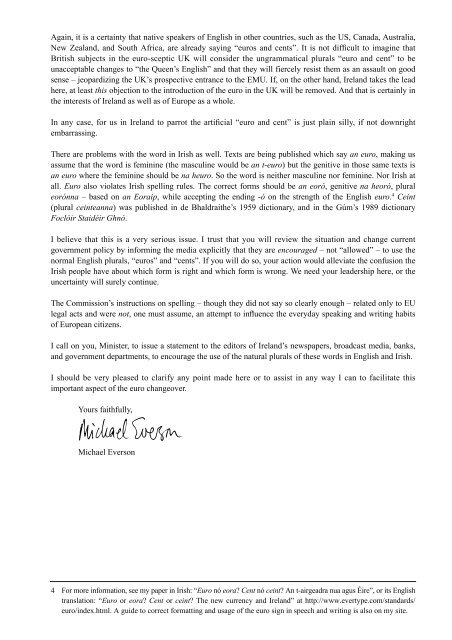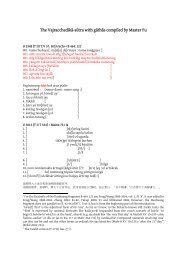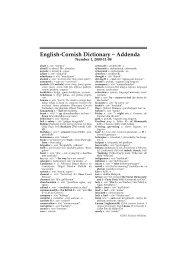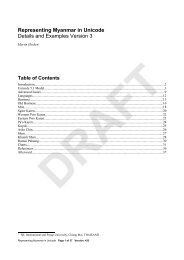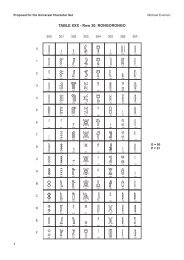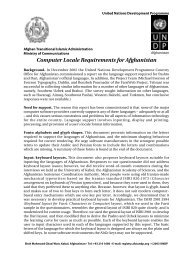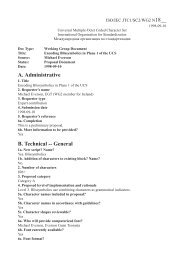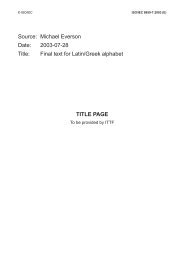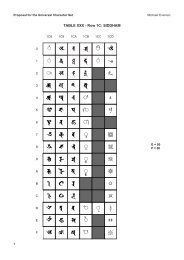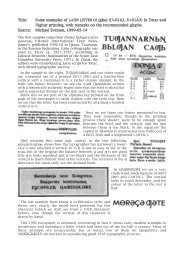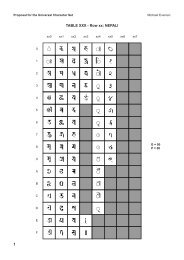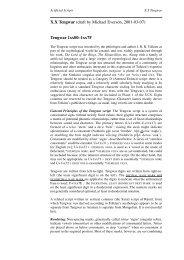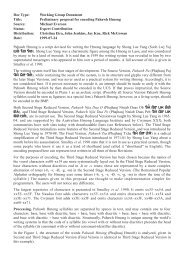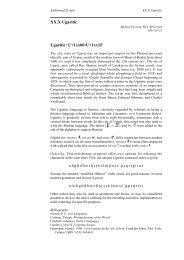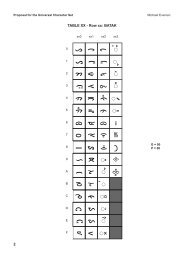open letter to the Irish Minister for Finance - Evertype
open letter to the Irish Minister for Finance - Evertype
open letter to the Irish Minister for Finance - Evertype
You also want an ePaper? Increase the reach of your titles
YUMPU automatically turns print PDFs into web optimized ePapers that Google loves.
Again, it is a certainty that native speakers of English in o<strong>the</strong>r countries, such as <strong>the</strong> US, Canada, Australia,<br />
New Zealand, and South Africa, are already saying “euros and cents”. It is not difficult <strong>to</strong> imagine that<br />
British subjects in <strong>the</strong> euro-sceptic UK will consider <strong>the</strong> ungrammatical plurals “euro and cent” <strong>to</strong> be<br />
unacceptable changes <strong>to</strong> “<strong>the</strong> Queen’s English” and that <strong>the</strong>y will fiercely resist <strong>the</strong>m as an assault on good<br />
sense – jeopardizing <strong>the</strong> UK’s prospective entrance <strong>to</strong> <strong>the</strong> EMU. If, on <strong>the</strong> o<strong>the</strong>r hand, Ireland takes <strong>the</strong> lead<br />
here, at least this objection <strong>to</strong> <strong>the</strong> introduction of <strong>the</strong> euro in <strong>the</strong> UK will be removed. And that is certainly in<br />
<strong>the</strong> interests of Ireland as well as of Europe as a whole.<br />
In any case, <strong>for</strong> us in Ireland <strong>to</strong> parrot <strong>the</strong> artificial “euro and cent” is just plain silly, if not downright<br />
embarrassing.<br />
There are problems with <strong>the</strong> word in <strong>Irish</strong> as well. Texts are being published which say an euro, making us<br />
assume that <strong>the</strong> word is feminine (<strong>the</strong> masculine would be an t-euro) but <strong>the</strong> genitive in those same texts is<br />
an euro where <strong>the</strong> feminine should be na heuro. So <strong>the</strong> word is nei<strong>the</strong>r masculine nor feminine. Nor <strong>Irish</strong> at<br />
all. Euro also violates <strong>Irish</strong> spelling rules. The correct <strong>for</strong>ms should be an eoró, genitive na heoró, plural<br />
eorónna – based on an Eoraip, while accepting <strong>the</strong> ending -ó on <strong>the</strong> strength of <strong>the</strong> English euro. 4 Ceint<br />
(plural ceinteanna) was published in de Bhaldrai<strong>the</strong>’s 1959 dictionary, and in <strong>the</strong> Gúm’s 1989 dictionary<br />
Foclóir Staidéir Ghnó.<br />
I believe that this is a very serious issue. I trust that you will review <strong>the</strong> situation and change current<br />
government policy by in<strong>for</strong>ming <strong>the</strong> media explicitly that <strong>the</strong>y are encouraged – not “allowed” – <strong>to</strong> use <strong>the</strong><br />
normal English plurals, “euros” and “cents”. If you will do so, your action would alleviate <strong>the</strong> confusion <strong>the</strong><br />
<strong>Irish</strong> people have about which <strong>for</strong>m is right and which <strong>for</strong>m is wrong. We need your leadership here, or <strong>the</strong><br />
uncertainty will surely continue.<br />
The Commission’s instructions on spelling – though <strong>the</strong>y did not say so clearly enough – related only <strong>to</strong> EU<br />
legal acts and were not, one must assume, an attempt <strong>to</strong> influence <strong>the</strong> everyday speaking and writing habits<br />
of European citizens.<br />
I call on you, <strong>Minister</strong>, <strong>to</strong> issue a statement <strong>to</strong> <strong>the</strong> edi<strong>to</strong>rs of Ireland’s newspapers, broadcast media, banks,<br />
and government departments, <strong>to</strong> encourage <strong>the</strong> use of <strong>the</strong> natural plurals of <strong>the</strong>se words in English and <strong>Irish</strong>.<br />
I should be very pleased <strong>to</strong> clarify any point made here or <strong>to</strong> assist in any way I can <strong>to</strong> facilitate this<br />
important aspect of <strong>the</strong> euro changeover.<br />
Yours faithfully,<br />
˛<br />
Michael Everson<br />
4 For more in<strong>for</strong>mation, see my paper in <strong>Irish</strong>: “Euro nó eora? Cent nó ceint? An t-airgeadra nua agus Éire”, or its English<br />
translation: “Euro or eora? Cent or ceint? The new currency and Ireland” at http://www.evertype.com/standards/<br />
euro/index.html. A guide <strong>to</strong> correct <strong>for</strong>matting and usage of <strong>the</strong> euro sign in speech and writing is also on my site.


